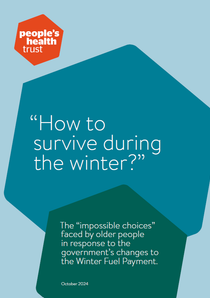Report overview
In July 2024, the UK government announced changes to the eligibility for Winter Fuel Payments in England and Wales. This was replicated by the Scottish Government in September. While around 1 million people are expected to qualify for additional support, according to Age UK, around 2.5 million older people on low incomes or who have other vulnerabilities will fall short of qualifying, placing their health at increased risk over winter.
This report focuses on the view and experiences of local, trusted, grassroots, expert community organisations working directly with older people across all parts of Great Britain.
We asked these organisations to share their views on the planned changes to the Winter Fuel Payment and to tell us about the reactions of older people to the announced cut. More than 30 organisations responded to our call, with some taking part in a focus group, many submitting written evidence, and several conducting their own discussion groups and surveys with older people in their communities based on our questions, which they shared back with us.
Through the community organisations’ testimony and evidence, a stark picture emerged, revealing that the announcements on changes to the Winter Fuel Payment are causing fear for older people’s mental and physical health. There is widespread shock, stress, anger, anxiety, confusion and concern amongst the older people these grassroots organisations work with.

Summary of older people's views
- Many organisations report the changes to Winter Fuel Payments are causing high levels of anxiety and stress amongst older people, and for some it is being cited as driving up levels of mental ill health.
- There is significant anxiety and fear about what this might mean for older people in terms of financial hardship and fuel poverty, and no longer being able to afford to heat their homes.
- There is a widespread sense of confusion due to a lack of information communicated about the changes, particularly on how to demonstrate eligibility under the new rules.
- Many older people said they don’t know how to claim benefits, or are unable to do so because they have small savings or private pensions which make them ineligible despite living “hand to mouth”.
“Their mental as well as physical health would potentially be affected through worrying about paying their increased bills and not having adequate heating and hot meals.”
People's Health Trust funded partner
Report recommendations
These recommendations have been shaped by the views of the organisations we heard from and the older people they work with.
- The government should cancel, or at least postpone until next winter, the proposed changes to the Winter Fuel Payment to avoid irreparable harm to millions of older people this winter.
- Any new proposals to change the Winter Fuel Payment must have undergone a thorough equalities impact assessment (under the Public Sector Equality Duty), which must pay serious attention to means testing with regards to ensuring health equity, alongside a consultation process to understand the impact on older people and older disabled people.
- There must be careful consideration of how policies like these are communicated, and how information reaches people who are most likely to be harmed by policy changes. This must recognise people’s different starting points, for example people who are unaware of the changes or are vulnerable to misinformation, or who are experiencing digital exclusion, language barriers, learning difficulties or isolation.
- Dedicated resources should be provided to the voluntary and community sector, which is at the front line of the implementation. This is essential if policies that relate to welfare support are to be successful and avoid relying on an already stretched and underfunded civil society to pick up the pieces, or on an overburdened NHS for an emergency safety net.

Download
"How to survive during winter?" The "impossible choices" facing older people following changes to the Winter Fuel Payment.
Download